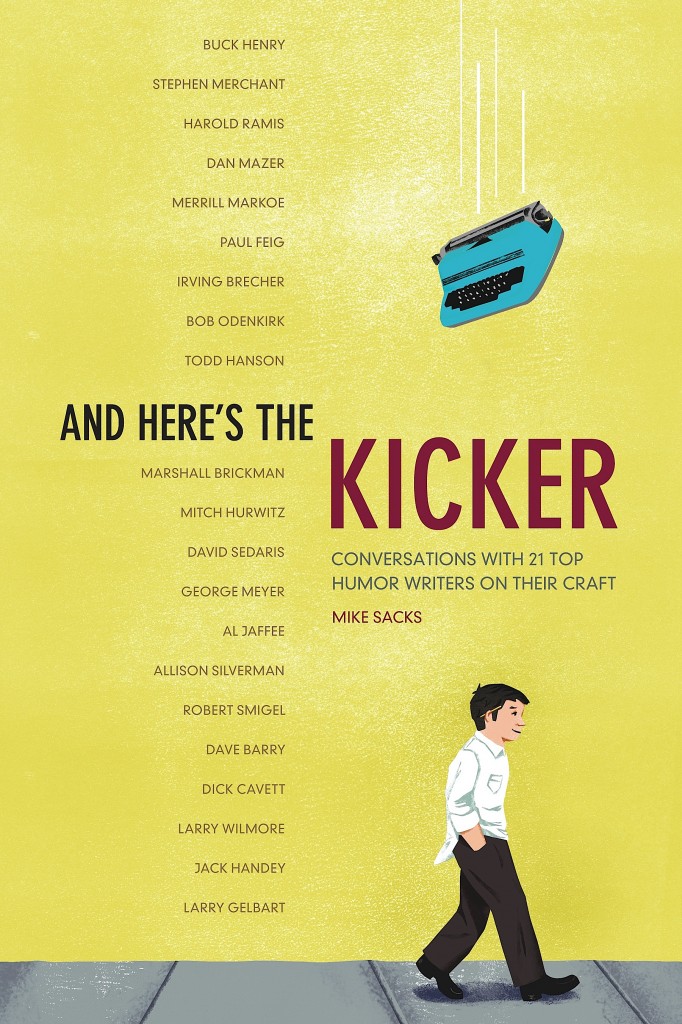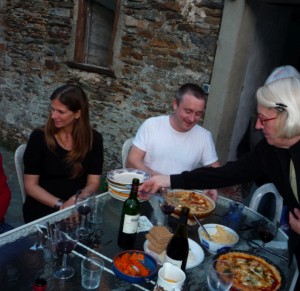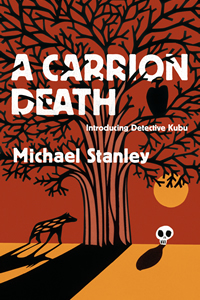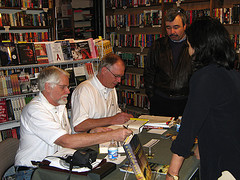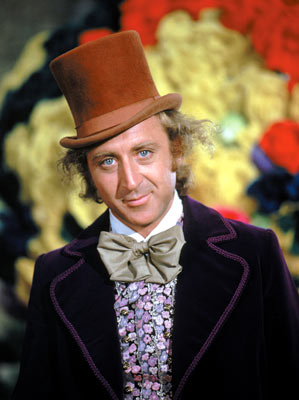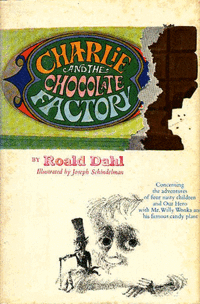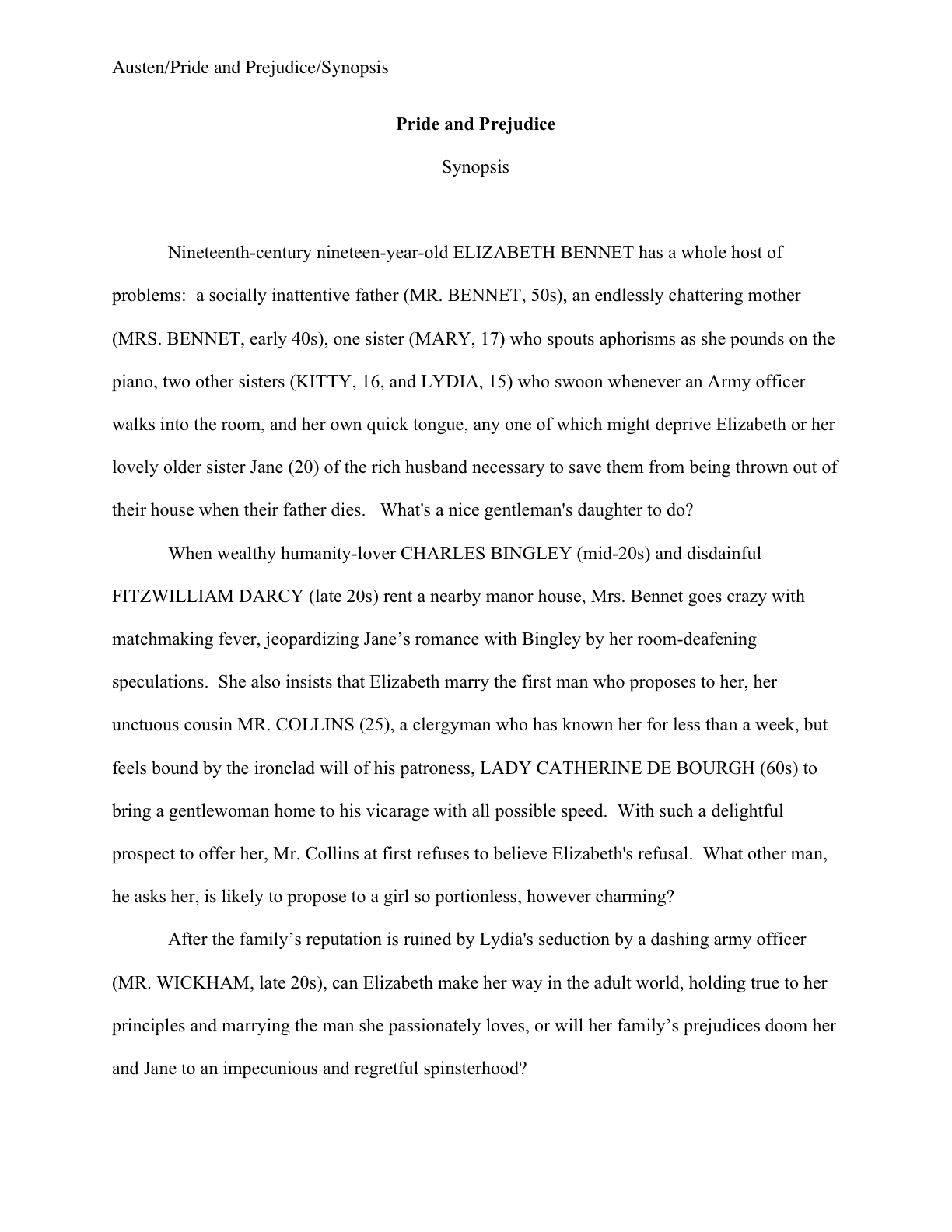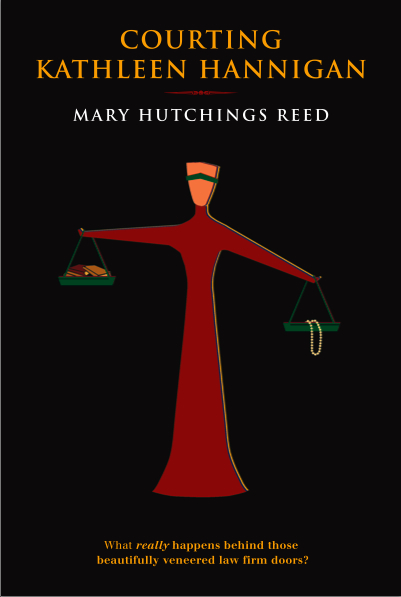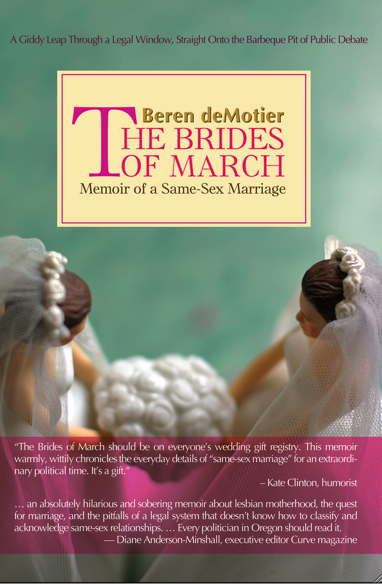
We’re nearing the end of our crash course on how manuscripts do — and don’t — move from the writer’s fingertips to publication, you’ll be glad to hear. And boy, have we covered a lot of territory over the last few weeks! Admittedly, I could conceivably have guided you over this trail with a somewhat speedier step, dwelling a bit less on the important details, but I consider a working knowledge of how the publishing industry in general, and agencies in particular, function an absolutely essential prerequisite for any aspiring writer intending to market her work.
If by some chance I hadn’t already made that abundantly clear. If I had my way, every writers’ association in the English-speaking world would regularly offer free weekend seminars on this stuff, to discourage any talented writer from walking into the querying and submission process blind.
Heck, I’d love to see this information taught in high schools, along with the basics of standard manuscript format. Now that would be one great English composition course.
Glancing back through the posts in this series, I was reminded of the old joke about the reporter interviewing the famous college professor about how long it typically takes him to write a half-hour lecture.
“Oh, all day,” the professor says, “if it’s a topic I’ve never lectured on before. Sometimes several days. Even a week, if I need to do background research.”
The reporter is awfully impressed at that level of dedication. “Wow, that’s a lot of work. How long to write an hour-long lecture on the same topic?”
The professor shrugs. “About three hours.”
The reporter wonders if the professor misunderstood the question, but after all, this is a learned man; no need to insult his intelligence. Slyly, he asks, “Well, how long would it take you to prepare a three-hour lecture, then?”
The professor smiles. “Would you like me to start right now?”
I suspect that I was reminded of this joke because I couldn’t help noticing that most of the posts in this series are approximately the length of my usual notes for an hour-long lecture, factoring in time for digression and questions — you can take the professor away from the rostrum, but not the rostrum out of the professor’s mind, apparently. But there’s more to it than that: I also believe that there’s a vital lesson here for those who are used to receiving their information about getting published in the kind of sound bites one hears the pros spouting at writers’ conferences and online.
It’s this: while brief, snappy advice may seem simpler, it’s actually significantly harder to produce, at least if it’s done thoughtfully. Unless, of course, the advice-giver is merely parroting the conventional wisdom on the subject, often expressed in dismissive one- or two- sentence bursts. Or as single-page, bullet-pointed to-do lists cribbed from a handout from another conference lecture or website.
Brevity may be the soul of wit, but it’s hardly best tool for explanation.
Trying to follow sound-bite advice is rather like gnawing on cubes of bouillon instead of drinking broth: the two substances may well contain the same ingredients, but it’s certainly easier to digest in the watered-down form. Particularly when, as is often the case for advice aimed at writers, the prevailing aphorisms are deceptively simple.
That’s why it’s both difficult and profoundly important for aspiring writers to come to understand that the much prevailing wisdom you hear glibly passing from mouth to mouth is the bouillon version, not the broth itself.
And frankly, the easy availability of bouillon can lead good writers astray. The combination of those over-concentrated pieces of advice that every writer has heard — the full range from basic writing tips like write what you know and show, don’t tell to the types of things agents and editors like to say at writers’ conferences like good writing will always find a home and it all depends on the writing — with the flat-out wrong popular conception that any genuinely good book will automatically find a publisher instantly can (and frequently does, alas) prompt an aspiring writer to conclude, wrongly, that the process should be easy for a genuinely marketable book. Because all that’s necessary to land an agent and/or editor is to have talent, right? So why bother to learn how to format the manuscript professionally, or to figure out the book category, or even to proofread? Isn’t it the agent and editor’s job to ferret out talent despite how it’s presented?
Um, no. It’s their job to discover writers who can reliably produce marketable prose, adhere to industry standards, and have talent. Even then, the writer’s going to have to take direction well.
Other aspiring writers who have imbibed the bouillon assume that if their manuscripts don’t get picked up right away at the query stage, the problem must be in the quality of the writing. If true talent always gets spotted, then why even speculate that an unprofessional query letter might be the culprit?
These conclusions are completely understandable, of course: it’s what the truisms have taught many aspiring writers to believe. But they are not the whole story, any more than a packet of bouillon is a vat of delicious soup.
Some of you are scratching your heads, aren’t you? “Hmm,” you muse, “is Anne being profound, or is she merely hungry?”
A little of both, I expect. Yet because I have dropped so much potentially quite intimidating information about how books typically get published upon all of you so quickly, I would imagine that the comparatively simple standard aphorisms might be sounding pretty good right about now. Just the facts, ma’am.
I could bore you all at this juncture with some ennobling platitudes about knowledge being power and valuable for its own sake — see my earlier comment about the difficulty of taking the professor out of the girl — but I’m not going to do that. Anyone with the dedication to have plowed through this, let’s face it, often-depressing series doesn’t need that pep talk. You’re all bright enough, I’m sure, to have picked up from my SUBTLE HINTS throughout this series that the archive list at right is so extensively categorized precisely so my readers may find answers to specific practical questions as they come up.
Instead, allow me to suggest something the bouillon-mongers seldom remember to mention: the primary reason that it often takes even excellent manuscripts quite a long time to find agents and a home with a major publisher is that this process is hard.
Anyone who tells you otherwise is probably either trying to promote a book or classes on how to get published — or is attempting to encourage all of the discouraged good writers out there to keep on going in the face of some pretty steep odds. Here’s an aphorism that you’re unlikely to hear at a writers’ conference that is nevertheless true: most aspiring writers give up on finding a home for their manuscripts too quickly.
Given how deeply affected by mercurial market fads agents’ and editors’ choices necessarily are, that’s truly a shame. Especially right now, when the economy is forcing the major publishing houses to be even more cautious than usual in what they acquire.
At the risk of repeating myself: hang in there. To recycle some bouillon of my own, the manuscript that gets rejected today may well not be the one that will get rejected a year or two from now.
But some of you may not be willing to wait that long to see your books in print. This, too, is completely understandable: contrary to what agents often seem to believe, most aspiring writers care more about having their writing available for others to read than about making scads of money on the deal.
Although a few wheelbarrows full of money would be nice, of course.
Which is why — to return to yesterday’s topic — it might make perfect sense to an agent to set aside a manuscript that he professes to love if it doesn’t elicit a fairly lucrative offer in its first circulation, in favor of marketing a client’s next book. In the agent’s mind, the first book hasn’t been discarded; it’s merely waiting to be part of a future multi-book deal.
Seriously, it happens all the time. If an agent thinks a writer has a voice that might hit it big someday, continuing to market that first manuscript to smaller or regional presses might seem like a bad career move, even though going with a smaller press might bring the book into print years earlier. (If these last two paragraphs sound like gibberish to you, you might want to go back and re-read the earlier posts in this series.)
Obviously, this is not necessarily logic that would make sense to a frustrated writer, particularly one who may have spent years and years landing that agent. Heck, even the expectation that there would be a second book ready to go by the time a handful of editors at big publishing houses have had a chance to take a gander at the first would make a lot of aspiring writers turn pale.
If not actually lose their respective lunches. Especially a writer who might have only intended to write one book in the first place.
Authoring only one book is a publishing strategy that often appeals to aspiring writers, particularly memoirists: you have a story to tell, and you tell it. Done. But that’s a career strategy that might not even occur to an agent excited by a new author’s voice.
There’s a reason that “So, what’s your next book?” is such a common question before the ink is dry on the representation contract, after all. Since even authors whose books are released by major publishers seldom make enough to quit their day jobs — remember, few books are bestsellers, by definition — agents tend to be on the lookout for career writers, ones ready, able, and eager to keep launching fine books into the marketplace. From their perspective, planning to write several marketable books is simply very good career sense for a writer who wants to make a living at it.
But that’s not every aspiring writer’s goal, is it? Is it?
Okay, so it is for a whole lot of aspiring writers. But if getting that first — and possibly only — book into print is a writer’s highest priority, investing a great deal of time and energy in landing an agent might not seem like a reasonable trade-off.
And that’s not the only reason a reasonable writer might have qualms about pursuing the standard major publisher route, either. Some might balk at all of the hoops through which large or mid-sized publishers expect first-time authors to leap, up to and including landing an agent first, for instance, or not be too thrilled about the prospect of an agent’s insisting upon changes to the manuscript in order to render it more marketable to the majors. Still others might feel, and rightly, that the time for their books to reach readers is now, not some dim, uncertain time several years hence.
The good news is that, contrary to the underlying assumptions of the bouillon trade, writers do have options other than the big publisher route. And I imagine those of you who have spent much of this series muttering, “Oh, God, NO!” will be overjoyed to hear that a great deal of what I’ve said so far will not apply to the next two sub-topics on our publishing hit parade: publishing through a small house and self-publishing.
No need to conceal your joy; I know, I know.
The small publishing house
Also known as an independent publisher because they are not affiliated with any of the major publishing houses (as imprints are), small presses are often willing to work with authors directly, rather than insisting upon receiving submissions only through agents. Typically, indie houses offer relatively small advances — or sometimes no advance at all — but that’s a calculated risk for an author. Sometimes, it can pay off big time: in recent years, some of the most exciting new fiction has started its printed life at a small press and gotten picked up later by a major publisher.
And because some of you will be able to think of nothing else until I answer the question you just mentally screamed two sentences ago, a writer should approach a small publisher precisely as one does an agent: after having done some research on who publishes what, find out how they prefer to be approached, and send a query.
In other words: as with an agency, it’s never a good idea to send unsolicited manuscripts. Ask first.
By the same token, it’s just as important to do a little research on an indie publisher as on an agent. A well-stocked bookstore is a great place to start; see who is bringing out books like yours these days. Both the Herman Guide and Writer’s Market have good listings of reputable small publishers. So does Preditors and Editors, a fine source for double-checking that the press whose website looks so appealing is in fact a traditional publisher, and not a printer of self-published books for pay.
Hey, you’d be surprised at how often their websites look similar.
I cannot stress sufficiently how important it is to doing your homework, and not merely to avoid being presented with a printing bill. Many an aspiring writer has wasted time and resources approaching a major house’s imprint in the mistaken impression that it’s an independent press, ending up summarily rejected.
How can a savvy writer tell which is which? Check the copyright page of a published book — you know, the one on the flip side of the title page — to see if the press that produced it is an indie or an imprint of a larger house. If it’s affiliated with a major, the copyright page will say.
Select a small press that has a track record of publishing books like yours before you approach. Rather than publishing across a wide variety of book categories, the smaller publishing house tends to specialize. This often turns out to be a plus for authors, as targeting a narrow market often means that a small press can afford to take more chances in what it acquires.
Why can they afford to take more chances, you ask with bated breath? Generally speaking, because their print runs are smaller and they spend less on promotion. And remember how I was telling you that their advances were usually small or non-existent?
Another cost-cutting move: the author usually ends up arranging — and financing the book tour himself. If, indeed, there are public readings at all. (For some useful tips on posts about how writers can set up their own readings, check out the guest posts by FAAB Michael Schein beginning here.)
In fact, over the last couple of years, it’s gotten downright common for small publishers, especially those who market primarily online, to employ the print-on-demand (POD) method, rather than producing a large initial print run, as the major houses do, and placing it in bookstores. (For an explanation of how print-on-demand works, please see the aptly-named PRINT ON DEMAND category on the archive list at right. Hey, I told you that the archive list was broken down into very specific topics!)
Check about this in advance, because POD carries some definite marketing drawbacks: POD books have an infinitely more difficult time getting reviewed (check out the GETTING A BOOK REVIEWED category for more details), and most US libraries have strict policies against buying POD books. So do some bookstore chains that shall remain nameless. (They know who they are!) Even some online retailers won’t carry POD books.
Why, you exclaim in horror? Well, for a lot of reasons, but mostly for because POD still carries a certain stigma; many, many bookbuyers who should know better by now still regard POD as the inevitable marker of a self-published book.
More on why that impression might present marketing problems follows next time. For now, what you need to know is that a small publisher that does not go the POD route is going to have an easier time placing your book on shelves and into the hands of your future readers.
Just something to keep in mind when you’re rank-ordering your list of indie publishers for querying purposes.
On the bright side, an author often has significantly more input into the publication process at a small press than a large one. Because it is a less departmentalized operation than a major publishing house, editors at indie presses often have the time to work more intensively with their authors. For a first-time author who gets picked up by a really good editor who genuinely loves the book, this can be a very positive experience.
It can also, perversely, render an author more attractive to agents and editors at the majors when he’s trying to market his next book. (Since indie presses seldom have much money to toss around, multi-book contracts are rare; see that earlier comment about miniscule advances.) A recommendation from an editor will give you a definite advantage in the querying stage for book #2: a query beginning, Editor Y of Small Publisher X recommended that I contact you about representing my book… is probably going to get a pretty close reading from any agent’s Millicent.
Why? Well, having a successful track record of pleasing an editor at an indie press is a selling point; I tremble to report it, but not all authors are equally receptive to editorial commentary. Also, from an agent’s point of view, the fact that there is already an editor at a press out there who is predisposed to read and admire your work automatically means her job will be easier — if the majors pass on book #2, the editor who worked on book #1 probably will not.
Which is to say: if your first book with a small press does well, they will probably want you to stick around — and might even become a trifle defensive if you start looking for an agent for book #2, especially if it is a press that ONLY works with unagented authors, or who prefers to do so. (Such presses are rare, but they do exist; it is undoubtedly cheaper to work with unagented writers — again, see that earlier comment about advances.)
Don’t be scared off by a presumption that signing with them would that you’re committing to a lifetime relationship. It doesn’t. Small publishers are aware their authors may HAVE to leave them in order to pursue larger markets. Consequently, they expect it. Also, people who work for small presses also understand that it’s not at all unheard-of for a writer to start out at a small press and move up to a big one with the help of an agent.
Actually, the more successful they are at promoting your first book, the more they could logically expect you to move onward and upward. Authors move from press to press all the time, without any hard feelings, and when well-meaning industry professionals genuinely respect an author, the last thing they want to do is to harm their future books’ chances of commercial success. In fact, if your subsequent books do well, the small press will benefit, because new readers will come looking for copies of your first book.
Everybody wins, in short.
That being said, a right of first refusal over your next book is a fairly standard contractual provision for publishers of any size, large or small. It means that when you sell them the first book, you agree to let them look at next before any other publisher does.
That can be very valuable to a small publisher, if your first book takes off. They already know that they like your writing (which means that it is not at all presumptuous for you to assume that they might want your next, incidentally), and they would rather not have to compete in order to retain you.
Translation: you might not see an advance for your next book, either. But if getting your work out there is your primary priority, is that really going to annoy you all that much?
The regional publishing house
This is industry-speak for small publishers located outside the publishing capitals of the world — unless you happen to be talking to someone who works at a major NYC agency or publishing house, in which case pretty much any West Coast publisher would fall into the regional category, too. Sometimes, these presses are affiliated with universities, but many are not.
I bring up conversational use of the term advisedly: if you’ve attended any reasonably large writers’ conference within the last two decades, you’ve probably heard at least one agent or editor talking about regional publishing houses as an alternative to the major publishers. Specifically, you may have heard them answer an attendee’s question with something along the lines of, “Well, I wouldn’t be interested in a romantic thriller about wild salmon conservation, but you might try a Pacific Northwest regional press.”
If you’re like most conference attendees, this response probably felt like a brush-off — which, in fairness, it almost certainly was. Most NYC-based agents who deal with major publisher houses prefer to concentrate on books (particularly novels) that have what they call national interest, rather than what they call mere regional appeal.
Basically, national interest means that a book might reasonably be expected to attract readers from all across the country; books with regional appeal, by contrast, might enjoy a fairly substantial market, but it would be concentrated in one part of the country. Or, to put it another way, books of national interest will strike agents and editors in New York City (or, to a lesser extent, Los Angeles, San Francisco, Toronto, and/or Chicago) as universally appealing.
Interestingly, books set in any of the boroughs of New York are almost never deemed of merely regional interest, even though novels set in Brooklyn do not, as a group, enjoy a demonstrably higher demand than those set in, say, Minneapolis. As far as I know, readers in Phoenix have not been storming bookstores, clamoring for greater insight into daily life in Queens, Chelsea, or Ozone Park. Yet it’s undeniable that many a Manhattan-based agent or editor would find such insights more accessible than those of the fine citizenry of eastern Nevada or the wilds of British Columbia.
Why? Well, it’s not all that uncommon for an NYC based agent or editor, as well as their respective Millicents, never to lived anywhere but the upper eastern seaboard of the United States. My agent boasts that he’s never lived more than ten miles from the hospital where he was born (and if you want to keep on his good side, learn from my sad example and don’t instantly exclaim, “Oh, you poor thing. You really need to get out more.” Trust me on this one.)
The moral: regional marketability, like beauty, most definitely resides in the eye of the beholder.
Which is precisely why a writer of a book with strong regional appeal should consider approaching a local small publisher — which, in most cases, means the local publisher, singular — or at any rate one based in your time zone. A book on homelessness in San Francisco may well strike a Bay Area editor as being of broad interest in a way that it simply wouldn’t to an agent in Manhattan; an incisive novel on the domestic trials of a Newfoundland fishing village might well make more sense to a Canadian editor, or at least can at least find Newfoundland on a map on the first try.
Unless, of course, that last book is by an author who has already won the Pulitzer Prize. Then, you have THE SHIPPING NEWS, and its interest is global. Name recognition is a great dissolver of borders.
Just because a regional press’ editors are more likely to understand the market appeal of your book, however, doesn’t necessarily mean that regional press will be able to get such a book national exposure (although it’s been known to happen.) Like other small publishers, regional presses that concentrate on a particular part of the country usually don’t have much money for book promotion.
What they have tends to be concentrated within a small geographical area. For some books, this works beautifully, but it’s unlikely to land an author on the New York Times’ bestseller list. Again: calculated risk.
Fair warning: contrary to the agent’s comment I reproduced at the beginning of this section, few regional presses actually publish fiction these days, at least in novel form. Some presses who specialize in regional nonfiction do publish short story collections; others will publish regional children’s books. But so few have published novels within the last ten years that I am always astonished when a NYC-based agent implies that they do.
Again, you’re going to want to do your homework before you query or submit. At least more homework than the agent who dismissed the Pacific Northwest novelist above.
Speaking of shifts in publishing, there’s something else you might want to know about approaching a small publisher.
Remember how I had said that things change? Well…
As pretty much any writer whose agent has been circulating a book for her recently could tell you (but might not, for fear of jinxing the submission process), selling a book to a major publisher has gotten a heck of a lot harder over the last couple of years. So much so that agents who would have huffily rejected the very notion of taking their clients’ work to an indie publisher just a few years ago have been thinking about it very seriously indeed of late.
More importantly for those of you who might be considering approaching a small publisher on your own behalf, some of them are actually doing it.
What does that mean for the unagented writer? Well, more competition, among other things, and more polished competition. In other words, an unagented writer’s book usually has to be even better than usual to land a spot in the print queue.
Also, as you may recall from earlier in this series, reputable agents only make money when they sell their clients’ books, so it’s very much in their interest to try to haggle up the advances on books sold to small publishers. In a company where there isn’t, as I mentioned above, much money to throw toward authors, guess what that tends to mean for the advances available for unagented books?
Uh-huh. But again, if your primary goal is to see your work in print, is that necessarily a deal-breaker?
Speaking of money, do make sure before you submit to a small publisher that it isn’t a subsidy press, one that requires authors to put up some percentage of the costs of publication. Unfortunately, not all subsidy publishers are up front about this; the latter’s websites can look awfully similar to the former’s. Before you cough up even one red cent — or, ideally, before you approach them at all — check with Preditors and Editors to see whether the publisher charges authors fees.
Which a traditional small publisher should not. But if chipping in to get your book published sounds like a reasonable idea to you, just you wait until next time, when I’ll be talking about self-publishing.
In any case, you’re going to want to proceed with care — and do your homework. Naturally, this swift overview isn’t the last word on small publishers: as I said, an aspiring writer thinking about going that route owes it to herself do extensive research on the subject. So hie yourself to a well-stocked bookstore, start pulling books in your category off the shelves, and see who published them. Then find out whether any of those presses are open to queries from unagented authors.
And then, who knows? Remember, the only manuscript that stands no chance of getting published is the one its writer never sends out.
I just mention. Keep up the good work!
